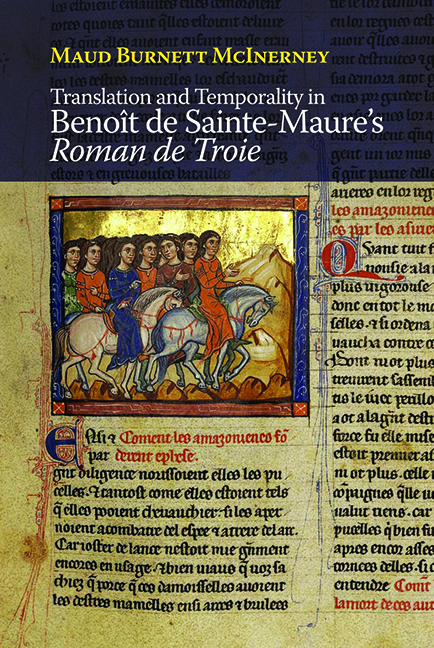Book contents
- Frontmatter
- Dedication
- Contents
- Acknowledgements
- List of Abbreviations
- Introduction: Trojan Time Machines
- 1 A Cupboard in Athens: Translating Troy
- 2 A Very Old Book, or How to Predict the Past
- 3 Ladies’ Time
- 4 Queer Time for Heroes
- 5 Hector in the Alabaster Chamber: Ekphrasis and its Discontents
- Conclusion: Trojan Futurities
- Appendix: The Manuscript Tradition of the Roman de Troie
- Bibliography
- Index
- Gallica
2 - A Very Old Book, or How to Predict the Past
Published online by Cambridge University Press: 07 October 2022
- Frontmatter
- Dedication
- Contents
- Acknowledgements
- List of Abbreviations
- Introduction: Trojan Time Machines
- 1 A Cupboard in Athens: Translating Troy
- 2 A Very Old Book, or How to Predict the Past
- 3 Ladies’ Time
- 4 Queer Time for Heroes
- 5 Hector in the Alabaster Chamber: Ekphrasis and its Discontents
- Conclusion: Trojan Futurities
- Appendix: The Manuscript Tradition of the Roman de Troie
- Bibliography
- Index
- Gallica
Summary
In the last chapter, I argued that the Roman de Troie asks to be read as a history, and also that history was, in the twelfth century, an extremely capacious genre embracing fiction as well as fact, poetry as well as prose. Perhaps the only element that is truly common to texts as varied as Orderic's Historia Ecclesiastica, Henry of Huntingdon's Historia Anglorum, Wace's Roman de Rou, and Benoît's Chronique des Ducs de Normandie is that all are concerned with the past. But what happens when a history, a tale of things past, looks suddenly to the present and even on to the future? In this chapter, I intend to argue that while Benoît cites Dares and Dictys and often draws on Ovid and other classical writers, one of his most significant influences is actually Geoffrey of Monmouth's De Gestis Britonum. The De Gestis Britonum, like the Roman de Troie, makes its claim to be history early, in the opening line, in fact: “While my mind was often pondering many things in many ways, my thoughts turned to the history of the kings of Britain.” What follows certainly looks like one kind of history: beginning with Brutus, the grandson of Aeneas, Geoffrey traces the lineage of the Kings of Britain down through the ages until 682 CE. The work constructs a linear chronology, reign by reign, father to son (or, in some cases, daughter), until the end of the sixth book when something peculiar happens and the prophecies of Merlin erupt. Regardless of whether they are true or false, a question much debated by Geoffrey's contemporaries, the prophecies of Merlin change the temporal orientation of the text; they not only predict the future from the perspective of those within the text, they carry on to predict a future occurring after the text ends with the fall of Britain to the Anglo-Saxons, and then further still to a future that extends through and even beyond the lifetime of the author. Geoffrey, the most widely read of all twelfth-century historians, models for Benoît first how to create authenticity for a long and fantastic narrative by claiming to translate an ancient and unread work;
- Type
- Chapter
- Information
- Publisher: Boydell & BrewerPrint publication year: 2021



